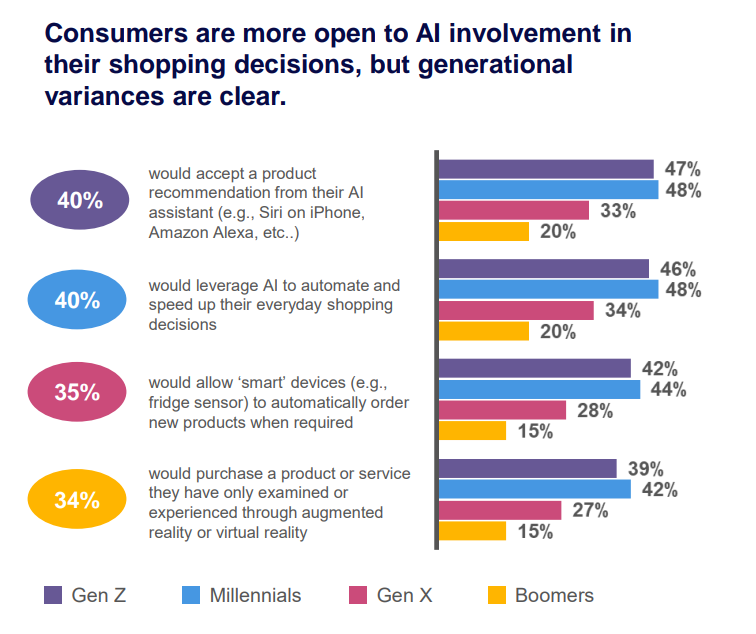Technology is revolutionizing wellness, making health management more personalized, accessible, and data-driven than ever before. In 2025, AI-powered tools, smart health devices, and digital commerce will reshape how consumers engage with their well-being. As wellness shifts from a product-centric to a priority-driven landscape, technology is playing a critical role in making health management more intuitive and effective.
However, this rapid digital transformation also brings new challenges. Trust and transparency are now critical for brands looking to leverage AI and digital commerce in the wellness space. Companies must balance innovation with credibility, ensuring that new technology-driven solutions genuinely enhance consumer well-being.
Read on as we explore the key technological advancements shaping wellness in 2025 and how brands can use it responsibly to build trust and create lasting consumer value.
Download the full article below!
The Rise of Tech-Enabled Wellness
Consumers are increasingly embracing digital-first wellness solutions, integrating technology into their daily health routines in ways never seen before. AI-powered assistants, wearable health devices, and social commerce are streamlining how people manage their well-being, making wellness more convenient and personalized. With 55% of consumers purchasing wellness products directly through social media and live-stream platforms, the time from discovery to purchase has been significantly reduced.1 Meanwhile, direct-to-consumer brands are leveraging AI-driven insights to deliver hyper-targeted wellness solutions, creating a seamless shopping experience that aligns with individual health goals. As consumers become more digitally engaged, brands that invest in intuitive, tech-enabled wellness solutions will remain ahead of the curve.
At the heart of this transformation is the power of AI and machine learning, which are revolutionizing predictive and preventive healthcare. Consumers are increasingly using AI to automate wellness decisions, with 40% willing to accept product recommendations from AI assistants and many leveraging AI to streamline shopping for health-related products.2 Wearable devices, like the Amazfit V1tal, are going beyond fitness tracking by providing real-time nutritional insights, while AI-driven skincare tools like the MULLI AI Dermascope personalize beauty and self-care routines. These advancements empower consumers to proactively monitor their well-being, shifting the focus from reactive healthcare to preventive self-management.
This shift toward technology-driven wellness goes beyond physical health, encompassing mental and emotional well-being as well. The concept of “omni-wellness” is taking shape, where tech-enabled solutions address the full spectrum of health needs. AI-driven mental health tools, personalized stress management programs, and biometric tracking are helping individuals gain deeper insights into their holistic well-being. As technology continues to blur the lines between physical, mental, and emotional health, consumers are demanding solutions that are not only data-driven but also seamlessly integrated into their lifestyles. Brands that embrace this omni-wellness approach will be best positioned to meet evolving consumer expectations in 2025 and beyond.
3 Key Technological Innovations Shaping Wellness
As technology continues to transform the wellness landscape, a wave of innovations is reshaping how consumers manage their health. From AI-driven personalization to smart health devices and immersive digital experiences, these advancements are making wellness more accessible, data-driven, and tailored to individual needs. As we explore the key innovations shaping wellness in 2025, it’s clear that technology is not just enhancing health management—it’s redefining it.
With that in mind, here are 3 key technological innovations shaping wellness:
1. AI and Smart Devices
Artificial intelligence is playing an increasingly central role in how consumers approach wellness, automating decisions and simplifying daily health management. With 34% of consumers using AI to streamline shopping for wellness-related products, digital assistants and predictive algorithms are transforming the way people discover and purchase health solutions.2 AI-powered recommendations are making it easier for consumers to find the right supplements, functional foods, and personal care products tailored to their unique needs. Whether through smart assistants that suggest stress-relief products based on behavioral patterns or apps that analyze sleep and activity data to offer personalized fitness plans, AI is making wellness more intuitive and accessible.

Smart devices are further enhancing this shift by integrating AI-driven automation into everyday routines. Smart fridges, for example, can now track food inventory and automatically reorder nutritious items based on a consumer’s dietary preferences and wellness goals. Similarly, AI-powered skincare devices analyze skin conditions and recommend personalized treatments, while connected fitness equipment adjusts workout plans in real-time based on biometric feedback. These innovations are reducing the guesswork in wellness management, allowing consumers to make informed decisions effortlessly. As AI and smart devices continue to evolve, they are not only making wellness more convenient but also fostering a more proactive and preventive approach to health.
2. Wearable and Smart Health Gadgets
Wearable health technology is advancing beyond basic fitness tracking, offering consumers real-time insights into their nutrition, activity levels, and overall wellness. Devices like the Amazfit V1tal are revolutionizing personal health management by automatically logging food intake and analyzing nutritional data.3 By eliminating the need for manual tracking, these wearables simplify the process of maintaining a balanced diet and optimizing fitness routines. This real-time feedback empowers consumers to make immediate, data-driven decisions about their health, from adjusting hydration levels to modifying workout intensity based on biometric readings. As consumers prioritize a more proactive approach to wellness, wearable technology is becoming an essential tool for monitoring and improving daily habits.
Beyond fitness and nutrition, AI-driven skincare solutions are personalizing beauty and self-care routines in unprecedented ways. The MULLI AI Dermascope, for instance, leverages artificial intelligence to analyze skin conditions and track changes over time, allowing users to receive tailored skincare recommendations.3 By integrating AI-powered diagnostics with personalized product suggestions, these smart beauty devices are enhancing consumer confidence in their skincare choices. As wellness expands to include holistic self-care, wearables and smart health gadgets are bridging the gap between technology and personal well-being, offering consumers an unprecedented level of precision and customization in their routines.
3. Digital and Social Commerce for Wellness
Social commerce is rapidly transforming how consumers discover and purchase wellness products, with TikTok Shop climbing to become the #8 eCommerce retailer.1 This shift has drastically shortened the time between product discovery and purchase, as consumers engage with influencers, live demonstrations, and AI-powered recommendations in real-time. Wellness brands are leveraging these platforms to create immersive shopping experiences, from live Q&A sessions on TikTok to interactive product showcases on Instagram and Facebook. The ability to make informed decisions instantly—by seeing expert demonstrations or reading real-time consumer feedback—has made social commerce a powerful driver of wellness product adoption.

At the same time, DTC wellness brands are using AI-driven insights to refine their marketing strategies and enhance personalization. By analyzing consumer behavior and preferences, AI allows brands to deliver highly targeted content, ensuring that wellness solutions reach the right audiences at the right time. Whether it’s personalized supplement recommendations, adaptive skincare regimens, or AI-curated fitness plans, these brands are creating a seamless, data-driven shopping experience that resonates with today’s health-conscious consumers. As digital commerce continues to evolve, brands that embrace AI-powered targeting and social selling will be best positioned to capitalize on the growing demand for tech-enabled wellness solutions.
Opportunities and Risks for Brands
As AI continues to shape the wellness landscape, brands have a significant opportunity to leverage hyper-personalization to drive engagement and loyalty. AI-powered recommendations are transforming consumer interactions, with smart assistants and predictive algorithms helping individuals discover wellness products tailored to their needs. Whether through dynamic meal planning apps, stress management tools, or personalized supplement regimens, AI-driven wellness solutions are creating more seamless and customized experiences. Companies that embrace adaptive technology—such as AI-curated fitness plans or real-time biometric tracking—can establish deeper consumer connections by offering meaningful, data-backed guidance on health and wellness.
Beyond personalization, innovation in smart health devices presents another major opportunity for brands looking to establish leadership in the wellness space. Wearables and AI-driven gadgets, such as the Amazfit V1tal and MULLI AI Dermascope, are setting new standards for real-time health tracking and self-care. As consumers seek more seamless ways to integrate wellness into their daily routines, companies investing in intuitive, connected health devices will gain a competitive edge. However, success in this space requires more than just technological advancement; brands must ensure that their products provide meaningful insights and tangible benefits to users. Developing devices that align with consumer needs—while maintaining affordability and accessibility—will be key to widespread adoption.
Despite these opportunities, brands must navigate growing consumer skepticism toward AI-driven wellness solutions. While personalization and automation can enhance convenience, consumers are increasingly cautious about the accuracy and intent behind AI-generated recommendations. Trust remains a key factor in adoption, with concerns about data privacy, the credibility of health claims, and the potential for brands to prioritize profit over well-being. Additionally, the rise of AI-generated advertising and automated shopping experiences introduces both opportunities and risks—brands that fail to provide clear, evidence-backed messaging risk losing consumer confidence. To succeed, companies must prioritize transparency, ensuring that their AI-driven wellness solutions are not only innovative but also ethical, reliable, and built with consumer interests at the core.
Make 2025 Better For Your Brand with NIQ
Understanding the state of the current market, your position in it, and evolving trends hinges on your ability to access up-to-date and accurate data. NielsenIQ tracks 1,000+ attributes across total store and 250+ NielsenIQ-only attributes and can get granular with Product and Label Insights.
Learn more about our Health & Wellness offerings and sign up for a demo to see product attribute data in action. Or watch the What’s Next in Wellness webinar with NIQ’s Sherry Frey for even more insights into the state of Wellness in 2025 and beyond.
Sources:
1 – TikTok Shop, data ending 11/2024
2 – NIQ Mid-Year Consumer Outlook: Guide to 2025
3 – NIQ What’s Next in Wellness Webinar




